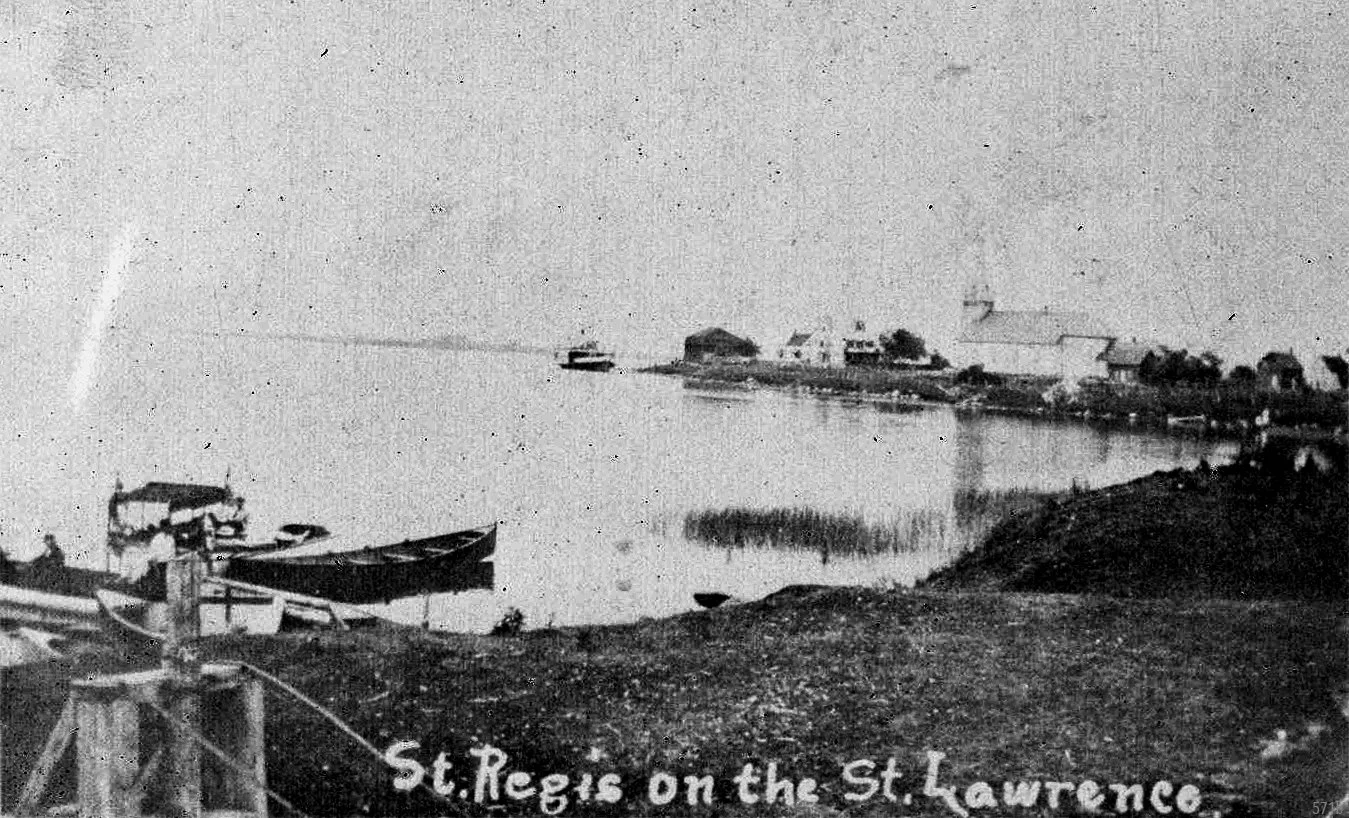Ruling the roost
A group of men participating in a meeting. (Courtesy: Kanien’kehá:ka Onkwawén:na Raotitióhkwa Language and Cultural Center)
Story told by Alma Ransom
When we moved from Yellow Island to the village of Ahkwesáhsne, my dad started attending the council meetings that happened about once a month. My parents only spoke Indian. After a while, I could understand some things in English, more than my dad. So, one day he said, “Come to the meeting with me and let me know what’s going on.” So, we went.
Women weren’t allowed to go to the council meetings but because I was just a little girl, I was able to go in and sit with him. I would tell him in Indian what they’re saying - things that were controversial, arguments they had or things like that.
When that first business of the (St. Lawrence) Seaway came, many of the counselors sitting at the table making decisions for our lives were not literate at all. I’m explaining to my father what the Indian agent is saying. He was ruling the roost.
It started before ‘56. Surveyors started staking out the islands that they were targeting. They were putting stakes in the ground and people were pulling them back out and then would be put in jail for government property destruction.
In Akwesáhsne, a ship canal was already there. It went in the St. Lawrence River, north of St. Regis Island and went directly to Cornwall. The seaway said they were just going to widen it and deepen it. Our people weren’t showing any reason to be against it because something already existed so not much would change. But then Ontario hydro came in behind them. That wasn’t the deal. They really changed the water system for us. They blocked the Long Sault rapids and harnessed the power from it. So much was done all at the same time. Eisenhower locks, Iroquois dam. There were islands that our people were living on that were flooded.
Getting back to those meetings, the Indian agent would be there, and you would hear something about the seaway coming in and he’s got six lawyers to back him up. We had none because the Indian Act says we couldn’t have any lawyers.
Nine of the 12 counselors only spoke Mohawk, they didn’t speak any English. So, I was a translator for them, as a child.
When there starts to be some kind of controversy, my father tells me, “Be quiet, be quiet.” He can hear that it’s getting nasty. But the guys close to us told my father, “Don’t stop the child from speaking because we’re listening to her too.”
I didn’t know all these terms they were saying but I knew more than they knew. The counselors certainly couldn’t read the beautiful papers they were signing. The Indian agent was just pushing and pushing them without them knowing what they were agreeing to. That was life.
The Indian agent took everything our people were telling him and did nothing. He just brushes them off and tells them that it’s time to say yes. I’m telling you, I’m going to go to my grave thinking about those men. But that’s how it was. We have fought the Seaway since.
KANIEN’KÉHA VERSION
↓
KANIEN’KÉHA VERSION ↓
Tahshakoniarotáhrhoke'
A view of the St. Lawrence River from Saint-Régis (Courtesy: Kanien’kehá:ka Onkwawén:na Raotitióhkwa Language and Cultural Center)
Alma Ransom IAKOKÁ:RATON
Sha'tiakwaná:tahkwe' ne Teken'tarèn:re' Ahkwesásne ionsaiakwátien', tontáhsawen' rake'níha eh iahà:re' tsi nihatitsénhaiens énska tsi niwenhnì:tes ronterihwahtentià:tha'. Nek Onkwehonwehnéha iatá:tiskwe' ne iontièn:'a. Kháre' ó:nen, ón:ton' onke'nikonhraién:ta'ne' tohkára niiorì:wake ne Tiohrhèn:sha kawennontáhkwen, sénha tsi ní:ioht ne rake'níha. Sewenhnísera ki' thí:ken wahèn:ron', "Ká:ts tenitsenhaiénhna tánon' takwatewennakará:tats tsi nahò:ten' kahtharáhkwen." Tó:kenske' eh ia'ákene'.
Iah tekonwatirihwá:wiskwe' ne konnón:kwe eh iakón:ne' tsi nihatitsénhaiens nek tsi tsi nek ieksà:'a nitia'to'ténhne', ón:ton' ia'katáweia'te' tánon' wa'tiatianitskwané:ken'. Onkwehonwehnéha enkatewennón:tahkwe' tsi enhihró:ri' nahò:ten' rotihtharáhkwen - tsi nahò:ten' iah skén:nen tekarihò:ten, tsi nahò:ten' wa'thatirihwakéhnhahte' tóka' ni' eh nikarihò:ten's.
Shonterihwíhewe' thí:ken Kana'tsherón:ni tsi niiorihò:ten, kwah iah tehatiwennahnóthahkwe' é:so rá:ti ratitsénhaiens ne eh tehonatekhwahra'tsheráhnhen ronte'nikonhrísa's nonkwarihwà:ke tsi iatiónhnhe'. Rake'níha ri'nikonhraientastén:ni tsi nahò:ten' rohtharáhkwen ne thí:ken Rahétien. Kwah tahshakoniarotáhrhoke'.
Ohén:ton ne 56 shiiohserò:ten tontáhsawen'. Ratiristì:sere's eh iahón:ne' wahonte'nién:tenste tsi kawehnó:ton wahonte'shennón:ni'. Eh ratinentsotónnions tánon' shatihniotónkwas nón:kwe sok tsi iontatehnhotónhkhwa' ienionkhiia'tón:ti' tsi iá:ken kakoráhsera' raotiientáhtshera' wa'tiakwà:rihte'.
Né: Ahkwesásne nonkwá:ti, ó:nen shikana'tsheratátie' kahonwé:ia' tsi kontohetstáhkhwa'. Kaniatarowanèn:ne ieiawenónhne', othorè:ke nonkwá:ti ne Ahkwesásne Tsi Kawè:note' tánon' eh teiotokénhton Tsi Kaná:taien'. Thí:ken Kana'tsheratátie' rontsterístha' wahonnì:ron' tsi nek tenhatitakà:ronste' tánon' enhatihnó:tetste' thí:ken. Iah othé:nen tehone'néston nontionkwè:ta' tsi rotirihwáien' eh nahò:ten' ase'kén ó:nen shikatátie' ok nahò:ten' tánon' iah kwah othé:nen tha'taontté:ni'. Sok thò:ne Ontario Hydro raotihnà:ken wahotikè:tohte'. Iah nè:'e tekarátie' tsi nahò:ten' kanonwaientáhkwen. Orihwí:io tsi wa'thatité:ni' ne ohné:ka' tsi ní:ioht tsi katátie' nonkwarihwà:ke. Wa'konwahnhó:ton' ne Long Sault kahnawáhere' tánon' wa'konwaié:na' ne ao'shatsténhsera'. Kwah nia'té:kon tsi nahatí:iere' tánon' ok énska tsi ní:ioht. Eisenhower kahnekahnhó:ton, Iroquois kaniá:ton. Wahatiwehnó:ten' é:so kawehnóhkwake néne ontiokwè:ta' thatinakerénionhkwe'
Sok á:re tsi nonkwá:ti thí:ken tsi nihatitsénhaiens, eh ì:re's thí:ken Rahétien tánon' ok nahò:ten' enhsà:ronke' ne thí:ken Kana'tsherón:ni aorihwà:ke tsi tá:we' tánon' ià:ia'k nihá:ti tehatirihwakéhnhas raonkwe'taientátie' thonwaswanónhnha'. Iah tseia'tátha teierihwakéhnhas teiontionkwe'taién:tahkwe' ase'kén thí:ken Indian Act iorihwénhton' tsi iah tewá:tons othé:nen teierihwakéhnhas thaiontionkwe'taién:ta'ne'.
Tióhton nihá:ti ne tékeni iawén:re ratitsénhaiens nek Kanien'kéha rontá:tiskwe', iah othé:nen Tiohrhèn:sha tehontá:tiskwe'. Wa'kheiatewennakará:tatshe' ki', tsi ieksà:'a nitia'to'ténhne'.
Tsi nó:nen nahò:ten' iah skén:nen tekarihò:ten taioke'tohtà:ne', rake'níha enhakhró:ri', "Tha'tesató:tat, tha'tesató:tat." Rahrónkha' tsi wahétken tsi niiawénhsere'. Né: ki' tánon tsi niká:ien' ákta tehontera'né:ken ne rake'níha wahonwahró:ri', "Tóhsa tenhshé:taste' thí:ken ieksà:'a tsi iontá:ti ase'kén ì:'i ò:ni' iakhiiatahónhsate'."
Iah akwé:kon tewake'nikonhraientà:'on tsi nikawennò:tens wahontá:ti' nek tsi sénha wake'nikonhraién:ta'skwe' tsi ní:ioht ne ronónha. Orihwí:io wáhi ne thí:ken ratitsénahiens iah thahatikwé:ni' ahatiwennahnó:ton' thí:ken kahiatonhserí:io's rontathsennarónnions. Nek orì:wakon tehshakò:re' thí:ken Rahétien kwah iah tehoti'nikonhraientà:sere' tsi nahò:ten' ratirihwanonhwè:sere'. Tho ki' ní:ioht tsi iakoterihwahtentién:ni tsi iakónhnhe'.
Thí:ken Rahétien kwah wahshakotahónhsatate' orihwakwé:kon tsi nahò:ten' ontionkwè:ta' wahonwahró:ri' nek tsi kwah iah othé:nen tehoié:ren. Nek wahshakotahonhsatè:kwa'se' tánon' wahshakohró:ri' tsi ia'káhewe' ahonthón:tate'. Kwah nè:'e ká:ton, ronónha kheianonhtonniòn:re' tsi enkatatia'táta'. Kwah tho niiohtòn:ne' ki' tánon'. Tho náhe tionkwaterí:io thí:ken Kana'tsheratátie'.
Edited by: Emma McLaughlin, Local Journalism Initiative Reporter
Translated by: Karonhí:io Delaronde


